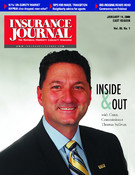The new year saw two reminders that the controversies over alleged bid-rigging, account steering and contingent commissions that began back in 2004 are not over.
On Jan. 2, The Travelers Cos. Inc. said it had agreed to pay $6 million to settle investigations in nine states and the District of Columbia. The St. Paul-based company reached agreements with attorneys general in Michigan, Florida, Hawaii, Maryland, Oregon, Texas, West Virginia, Massachusetts and Pennsylvania and the District of Columbia. The Florida Office of Insurance Regulation also joined the settlement. The settlement still needs court approval.
On Jan. 4, in another case, an insurer found itself being sued by the Massachusetts attorney general over similar charges.
The Travelers settlement ends a 2004 shareholder lawsuit questioning the contingent payments to brokers and including allegations that it rigged bids. The company had lost an earlier effort to dismiss the lawsuit, which sought class action status.
State attorneys general have argued that “contingent commissions” paid to brokers and agents to steer business to insurance companies amount to kickbacks that result in higher prices paid by policyholders.
Travelers has already said it would stop paying such commissions on all insurance lines beginning this year, under an agreement with other attorneys general announced last January.
According to the complaint, Travelers allegedly participated in an intricate bid-rigging scheme with broker Marsh & McLennan.
Great American Case
In the second related story, Massachusetts Attorney General Martha Coakley on Jan. 4 accused Great American Insurance Group of bid-rigging for what she says was a fake price quote it submitted in 2004 to a Norwood technology firm.
Coakley filed a lawsuit alleging that in 2004 Great American conspired with Marsh & McLennan to submit a $450,000 quote to Analog Devices Inc. so that another insurer’s $400,000 bid would appear competitive.
Great American has shot back, claiming its actions have been lawful and that it has tried to reach an out-of-court resolution, but that Coakley has been “unreasonable” in her demands. It vowed to “vigorously defend” itself.
The lawsuit alleges that Marsh steered another one of Analog Devices’ insurance policies to Great American at a predetermined price of $60,000 to reward the insurer for submitting the allegedly inflated quote.
Coakley says Great American aided Marsh by paying it contingent commissions based on the volume of business it placed with the insurer.
The Cincinnati-based specialty commercial lines insurer said it has “tried for an extended period of time to reach resolution of the issue without litigation.” Great American said it has been released from any potential issue with Analog Devices the corporate entity relevant to the one quote that is the subject of the attorney general’s suit.
Coakley’s suit seeks civil penalties and restitution. The lawsuit names Great American, along with Professional Risk Brokers Inc., a Great American subsidiary, as defendants. Marsh is not named as a defendant, but Marsh paid $850 million to settle similar allegations in New York.
Was this article valuable?
Here are more articles you may enjoy.


 State Farm Adjuster’s Opinion Does Not Override Policy Exclusion in MS Sewage Backup
State Farm Adjuster’s Opinion Does Not Override Policy Exclusion in MS Sewage Backup  Judge Tosses Buffalo Wild Wings Lawsuit That Has ‘No Meat on Its Bones’
Judge Tosses Buffalo Wild Wings Lawsuit That Has ‘No Meat on Its Bones’  Former Broker, Co-Defendant Sentenced to 20 Years in Fraudulent ACA Sign-Ups
Former Broker, Co-Defendant Sentenced to 20 Years in Fraudulent ACA Sign-Ups  Lemonade Books Q4 Net Loss of $21.7M as Customer Count Grows
Lemonade Books Q4 Net Loss of $21.7M as Customer Count Grows 


